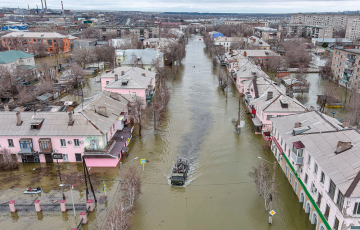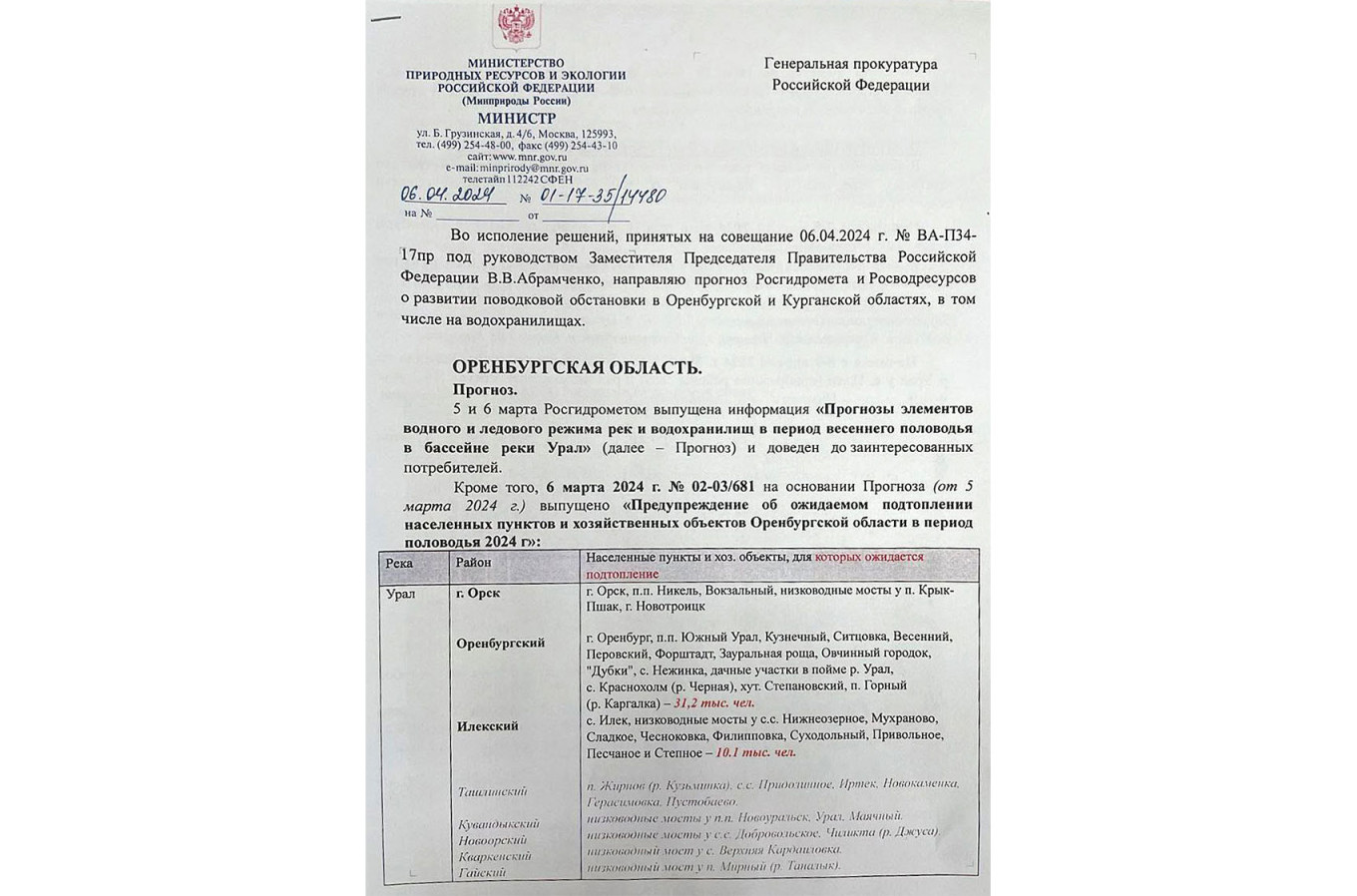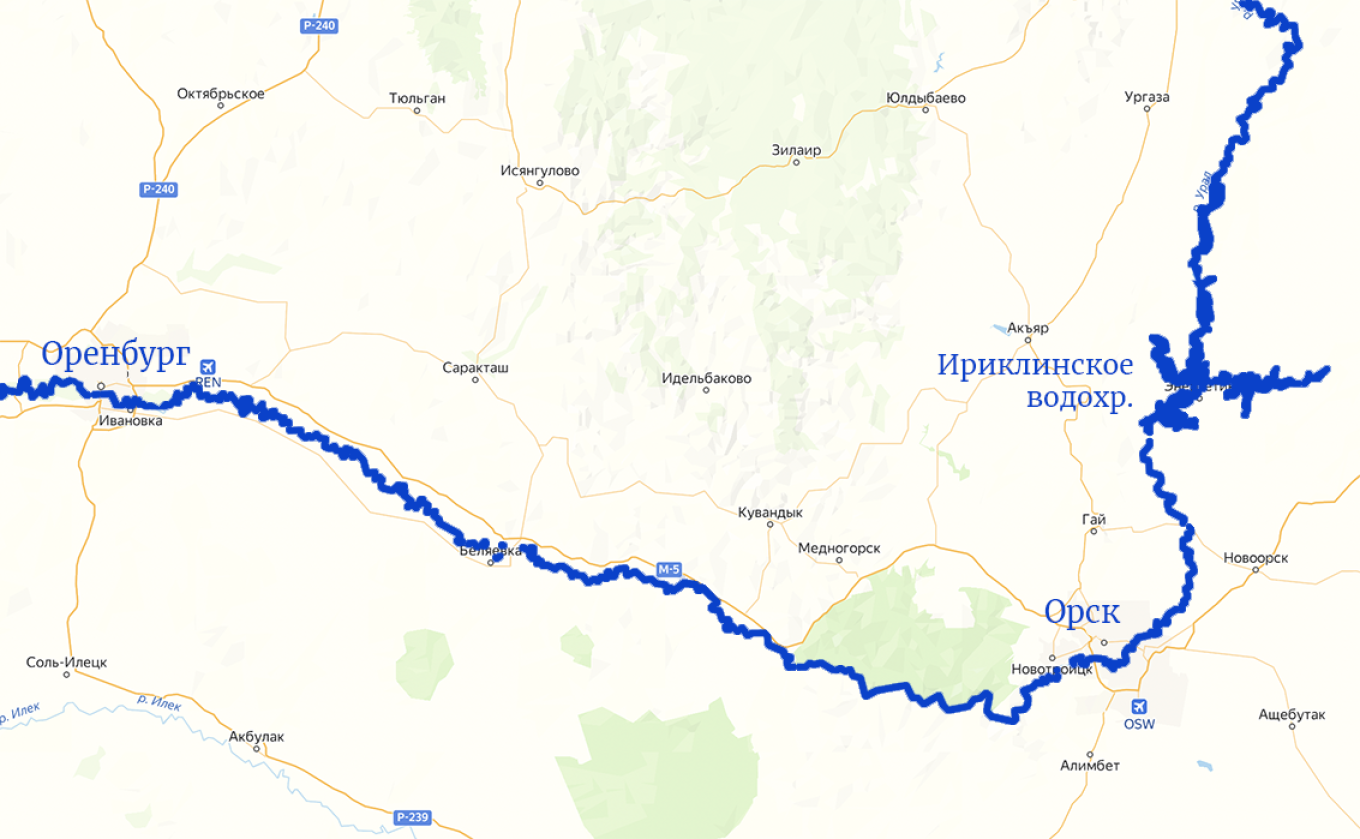Why Did Russian City Of Orsk Go Under Water?
18- 10.04.2024, 8:02
- 26,194

Putin's security guard "missed" the flooding in the Orenburg region.
The Russian Emergency Situations Ministry of Russia a month ago had information about the upcoming powerful flood in the Orenburg region, it follows from the document, which was at the disposal of The Moscow Times.
It was possible to reduce the damage from the flood by adjusting the water level in the Ural River, making room for flood waters in the Irikla reservoir in advance, the expert believes. Having "missed" the right moment for this, officials were forced to sharply dump water from the reservoir, the flow of which the dam in Orsk could not stop.
On the evening of April 5, in Orsk with a population of more than 200,000 people, the city dam built along the Ural River coast burst, water rushed into the city, and the evacuation of flooded areas began. On April 7, a state of emergency on a federal scale was declared in the Orenburg region. More than 6,600 houses were flooded in Orsk, and more than 10,000 in the entire region. Flooding also threatens the region's half-million-strong capital, Orenburg, as well as the Kurgan and Tyumen regions.
"Water reserves are above the long-term averages"
On April 6, a day after the dam in Orsk broke and the evacuation began, the Ministry of Natural Resources and the Prosecutor General's Office sent a letter to the Ministry of Emergency Situations with a reference to the forecast of the Russian Meteorological Service and the Federal Water Resources Agency for flooding in the Orenburg and Kurgan regions dated March 5.

Officials "reinsure themselves and disclaim responsibility, they said, they warned," a source in the Ministry of Emergency Situations, who provided the document, explained to The Moscow Times. A powerful flood in the region was also expected by the Ministry of Emergency Situations. On March 19, the Main Directorate of the Ministry of Emergency Situations in the Orenburg region published a forecast of rising water levels, according to which "the highest levels of spring flood in most rivers will be higher than normal."
At the end of February, at a meeting of the Regional Commission for the Prevention and Elimination of Emergency Situations, the Vice-Governor of Orenburg Sergey Balykin said that "the water reserves in the snow cover are higher than the long-term average values", soil freezing prevents water from leaving, the depth of soil freezing is 7 times higher than the average of previous years. Based on this, officials proposed to take "preventive measures", including preparing the reservoirs of the region for flooding.
After such a forecast, the authorities could, if not avoid it, then minimize the scale, says Oleg Dyukarev, CEO of the expert organization Meka, which in 2010 prepared an examination of the Orsk dam that could not withstand the flood. "It was necessary to avoid overflowing the Irikla Reservoir," he said.
The management of the reservoir could have underestimated the risks, and the water was saved for the dry season, says marine geological engineer Konstantin Ranks: "In Eurasia, the absolutely terrible hydrological situation. There is a lot of water in the spring, and then summer and drought come. Consequently, the same reservoir serves as a source of water – and drinking, and for irrigation, and for everything else. Here is a person sitting and sees that the reservoir is full and if it is released in early March, the flood will be postponed. But on the other hand – if suddenly nothing will happen, and the water will no longer come on such a scale and it will have an unfilled reservoir."
"Reservoir Critical Filling"
The Irikla Reservoir, the largest reservoir in the Southern Urals, was established in 1970 to generate electricity from the Irikla HPS and protect the region from floods. Orsk is the nearest large settlement to the reservoir, located downstream of the Ural River. The distance from the reservoir to the city is only 60 km. Another 280 km downstream of the river is the regional center of Orenburg. The Irikla Reservoir is controlled by the Federal State Unitary Enterprise Tsentrregionvodkhoz, subordinate to the Ministry of Natural Resources. The organization's website states that it manages the activities of all reservoirs in Russia, accumulating and discharging water, and regulates the level of rivers.

In early March, when officials already had information about the upcoming powerful flood, the Irikla Reservoir was filled by 82% and dumped only 15 cubic meters of water per second, it follows from the data on the state of the reservoir analyzed by The Moscow Times. Only by the end of March, the discharge was slightly increased — up to 90 cubic meters per second. At the same time, the volume of water in the reservoir gradually grew and in early April amounted to 92%.
"Knowing the forecast of a high spring result, we prepared the Irikla Reservoir. Before the flood, the water level was below stable levels," said Vadim Nikanorov, the Deputy Head of the Federal Agency for Water Resources, on April 7. This is at odds with the open official data on the reservoir, analyzed by The Moscow Times. It follows that in March 2022 the reservoir was filled by 76%, in March 2023 – by 67%.
Only on April 2, three days before the start of the flood in Orsk, the reservoir sharply — 18 times — increased the discharge first to 1672, and then to 2170 cubic meters per second. As a result, the water level in the river rose to 9.6 meters in the Orsk region by the evening of April 5, despite the fact that the protective city dam was designed only for 5.5 meters.
Dyukarev believes that the dam was unable to cope with such a sharp rise of the Ural River: "When the categorically critical filling came, the Irikla Reservoir opened the locks, but because of the almost volley discharge of water, the entire Ural River was filled. First, the dam was filled and degraded. It has collapsed in 3 places to date.”
"No forecasting"
Formally, the decision on the accumulation and discharge of water is made collectively by local and federal authorities. The regional interdepartmental flood control commission headed by the vice-governor together with the Nizhny-Volzhsk Basin Water Department of the Federal Water Resources Agency should develop a schedule for receiving and discharging water, following the decree of the government of the Orenburg region.
However, in reality, the Tsentrregionvodkhoz federal organization managing the reservoir can ignore the regional commission's decision and wait for instructions from the Federal Department of the Ministry of Emergency Situations, a source in the ministry told The Moscow Times.
But the Ministry of Emergency Situations, according to him, has no good forecasting, working models for the development of events and control over the situation. The National Center for Crisis Management (NCMC) of the Ministry of Emergency Situations develops forecast models for floods and proudly demonstrates them to the government and the president, but "in fact, they could not predict a single flood," the source of The Moscow Times claims.
"There are no specialists in the regions, there is no possibility to forecast or model the developments. The Ministry of Emergency Situations pretended to collect data from the federal subjects for analysis," he concludes.
Another rescuer from the FSO.
Based on the forecasts of the center, the Federal Emergency Commission "coordinates and controls" the discharge or collection of water, explains a source in the Ministry of Emergency Situations. The Federal Commission for Emergency Situations is headed by the head of the Ministry of Emergency Situations Alexander Kurenkov, who served in the FSO (the Federal Protective Service) from 2002 to 2021, and in 2021–2022 — Deputy Director of Rosguard (the Federal National Guard Troops Service). Kurenkov headed the Ministry of Emergency Situations in May 2022 after the death of another Putin's guard, Yevgeny Zinichev, in this post. He died in September 2021 in the Putoransky Reserve during the filming of the educational movie by the Ministry of Emergency Situations. According to the official version, saving a slipped operator.
Almost a day after the flooding began in Orsk, Putin ordered Kurenkov to "immediately fly to the natural disaster zone to organize all the necessary work," the Kremlin Press Service said on Saturday evening.
"The head of state, in a conversation with Kurenkov emphasized the need for timely analysis, forecasting and taking appropriate measures regarding the situation that is unfolding with possible flooding in the Kurgan and Tyumen regions," the Kremlin spokesman reported the next day.
"In connection with the forced increase in water discharge at hydraulic structures caused by an anomalous increase in water levels over the past 100 years, the inevitability of flooding was noted," the Kremlin said on the same day following a conversation between Putin and the governors of the Kurgan and Tyumen regions.
Arriving at the scene of the emergency, Kurenkov first of all told reporters that the Ministry of Emergency Situations had warned Orsk residents in advance of the danger and offered evacuation a week before the flood. According to locals, the real evacuation began only on Friday evening, when the water had already begun to arrive in the city.
"Everyone is guilty"
The governor of the Orenburg region, Denis Pasler, had to communicate with angry locals. Several hundred residents of Orsk gathered on Monday evening at the administration building and demanded a meeting with the governor under the shouts of "Shame" and "Putin, help!". The local Prosecutor's Office even issued a warning about the inadmissibility of uncoordinated protest actions.
At a meeting with an initiative group of protesters, Pasler first rudely demanded to remove the phones and not film him and then complained that he was forced to cancel his vacation due to flooding.
Denis Pasler worked in the government of the Sverdlovsk region, and in 2019 he was appointed acting governor of the Orenburg region.
"Everyone is guilty," Pasler said, answering a question about the causes of the flooding. "I have no doubt that criminal cases will be brought and guilty verdicts issued," the governor added. The Investigative Committee has already initiated a criminal case on the fact of dam failure under the articles on negligence and violation of safety rules during construction.
At the same time, the official praised the local residents who "have already bought boats" and themselves "really go and save": "A bunch of territories where people spend their money to feed and water. <…> They are real patriots!".
Local residents themselves are engaged in evacuation, temporary accommodation facilities are not ready on a sufficient scale, a source in the Ministry of Emergency Situations confirms the deplorable situation with the flood response. "The people of the Ministry of Emergency Situations are coming now from all over Russia, but only 300 rescuers left out of 1,500 (rescue) group. The rest of the federal subject services are just housing and communal services workers, etc." "The situation was missed, just fucked up," he concludes.
By April 9, more than 10,000 houses were flooded throughout the region, more than 6,000 residents were evacuated. The government of the region began to make the first payments to the victims – up to 100,000 rubles, if the property is lost completely. At a rally on Monday, at the request of the people, Governor Pasler promised to pay the full value of the lost property.









